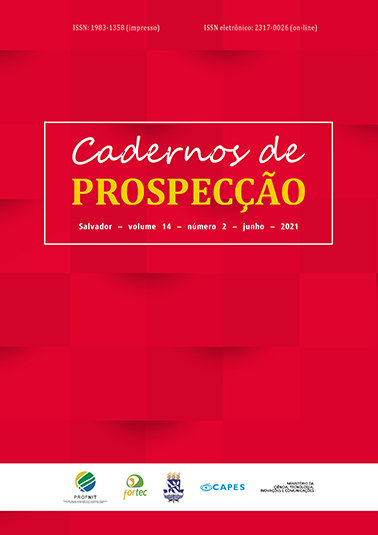Intellectual Property for Innovation: perceptions and perspectives in a technical school
DOI:
https://doi.org/10.9771/cp.v14i2.36965Keywords:
Innovation Teaching, Training for work, Intellectual Property.Abstract
The teaching of content related to innovation and intellectual property is crucial for the training of professionals able to work in the context of the knowledge economy. This article portrays the main conclusions of an exploratory research that examined whether this theme is addressed in technical courses at the high level of the Federal Institute of Ceará – Campus Caucaia. Through questionnaires with students, semi-structured interviews with teachers and analysis of pedagogical projects, favorable aspects, needs and barriers for teaching such content were observed. Among the results, the study showed that teachers not only consider the inclusion of the theme in educational activities relevant, but also defend the expansion of investment in teacher training to improve the levels of these activities. The results also reveal useful information to improve the planning of pedagogical actions, as well as to carry out new studies on the topic.
Downloads
References
AMORIM-BORHER, M. B. et al. Ensino e Pesquisa em Propriedade Intelectual no Brasil. Revista Brasileira de Inovação, Rio de Janeiro, v. 6, n. 2, p. 281-310, maio, 2007. Disponível em: https://periodicos:sbu:unicamp:br/ojs/index:php/rbi/article/view/8648949. Acesso em: 17 nov. 2019.
ARAÚJO, G. G. de et al. Produção de Patentes no Estado do Ceará: um estudo comparativo entre as instituições públicas. Cadernos de Prospecção, Salvador, v. 4, n. 11, p. 966-982, 2018. Disponível em: https://portalseer:ufba:br/index:php/nit/article/view/27131. Acesso em: 17 nov. 2019.
BARDIN, Laurence. Análise de conteúdo. Lisboa: Edições 70, 1977.
BRASIL. Lei n. 9.394/96, de 20 de dezembro de 1996. LDB. Brasília, DF, 20 dez. 1996. Disponível em: http://www.planalto.gov.br/ccivil_03/leis/l9394.htm. Acesso em: 29 maio 2019.
BRASIL. Lei n. 13.243/2016. Dispõe sobre estímulos ao desenvolvimento científico, à pesquisa, à capacitação científica e tecnológica e à inovação, janeiro 2016. Disponível em: http://www:planalto:gov:br/ccivil_03/_Ato2015-2018/2016/Lei/L13243:htm. Acesso em: 3 jun. 2019.
CAVALCANTI, A. M.; BEMFICA, E. A. Disseminação da Propriedade Intelectual como Estratégia para Políticas de Ciência, Tecnologia e Inovação: o caso do Sistema Pernambucano de Inovação (SPIn). Cadernos de Prospecção, Salvador, v. 12, n. 1, p. 15-30, março, 2019.
DE NEGRI, Fernanda. Novos caminhos para a inovação no Brasil. Washington, DC: Wilson Center, 2018. 159p.
FARIA, A. X. de. O Ensino da Propriedade Intelectual nos Cursos de Graduação do Brasil: Razões e Proposições. 2011. 110p. Dissertação (Mestrado Profissional em Propriedade Intelectual e Inovação) – Instituto Nacional de Propriedade Industrial, Rio de Janeiro, 2011.
GIL, A. C. Métodos e Técnicas de Pesquisa Social. 6. ed. São Paulo: Atlas, 2008.199p.
GIMENEZ, A. M. N.; BONACCELLI, M. B. M.; CARNEIRO, A. M. The Challenges of Teaching and Training in Intellectual Property. Journal of Technology Management & Innovation, Santiago, Chile, p. 176-188, nov. 2012. Disponível em: https://scielo:conicyt:cl/scielo:php?pid=S0718-27242012000400014&script=sci_arttext&tlng=em. Acesso em: 16 nov. 2019.
INPI – INSTITUTO NACIONAL DA PROPRIEDADE INDUSTRIAL. Cooperação entre os escritórios de PI do BRICS. 2019. Disponível em: http://www:ipbrics:org/index:html. Acesso em: 10 nov. 2019.
KRUGLIANSKAS, I.; MATIAS-PEREIRA, J. Um enfoque sobre a Lei de Inovação Tecnológica do Brasil. Revista de Administração Pública, Rio de Janeiro, v. 39, n. 5, p. 1.011-1.029, 2005. Disponível em: http://bibliotecadigital:fgv:br/ojs/index:php/rap/article/view/6577/5161. Acesso em: 15 nov. 2019.
LAMANA, S.; FRANSCISCO, A. C. de. O Ensino de Propriedade Intelectual nas Escolas Técnicas. In: IV SIMPÓSIO NACIONAL DE ENSINO DE CIÊNCIA E TECNOLOGIA. Ponta Grossa: [s.n.], 2014, SINECT. Anais [...]. Ponta Grossa, PR, 2014. Disponível em: http://www:sinect:com:br/anais2014/. Acesso em: 16 nov. 2019.
LUDKE, Menga; ANDRÉ, Marli E. D. A. Pesquisa em Educação: abordagens qualitativas. São Paulo: Epu, 1986.
LONGHI, Simone Raquel Pagel; BENTO, Karla Lucia. O político-pedagógico: uma ação coletiva. Revista de Divulgação Técnico-Científica do ICPG, [s.l.], v. 3. n. 9, jul.-dez, 2006.
MORE: Mecanismo Online para Referências, versão 2.0. Florianópolis: UFSC Rexlab, 2013. Disponível em: http://www.more.ufsc.br/. Acesso em: 4 jun. 2019.
OMPI – ORGANIZAÇÃO MUNDIAL DA PROPRIEDADE INTELECTUAL. Índice Global de Inovação 2019: Índia registra grandes avanços, enquanto Suíça, Suécia, EUA, Países Baixos e Reino Unido lideram a classificação. 2019. Disponível em: https://www.wipo.int/export/sites/www/pressroom/pt/documents/pr_2019_834.pdf. Acesso em: 15 nov. 2019.
PROEN/IFCE (Fortaleza). IFCE em Números. 2020. Disponível em: http://ifceemnumeros.ifce.edu.br/. Acesso em: 22 mar. 2020.
PROFNIT – PROGRAMA DE PÓS-GRADUAÇÃO EM PROPRIEDADE INTELECTUAL E TRANSFERÊNCIA DE TECNOLOGIA PARA A INOVAÇÃO. Rede PROFNIT. 2020. Disponível em: http://www.profnit.org.br/pt/sample-page/. Acesso em: 6 jun. 2020.
TAKAGI, Y.; ALLMAN, L.; SINJELA, M. A. Teaching of Intellectual Property: Principles and Methods. Nova York: Cambridge University Press, 2008. 333p.
WIPO – WORLD INTELLECTUAL PROPERTY ORGANIZATION (Suiça). (ed.). Teaching Intellectual Property (IP) in Countries in Transition. Genebra: Wipo – World Intellectual Property Organization, 2013. 100p. Disponível em: https://www.wipo.int/edocs/pubdocs/en/wipo_pub_transition_7.pdf. Acesso em: 10 nov. 2019.
Downloads
Published
How to Cite
Issue
Section
License
Copyright (c) 2021 Cadernos de Prospecção

This work is licensed under a Creative Commons Attribution-NonCommercial 4.0 International License.
O autor declara que: - Todos os autores foram nomeados. - Está submetendo o manuscrito com o consentimento dos outros autores. - Caso o trabalho submetido tiver sido contratado por algum empregador, tem o consentimento do referido empregador. - Os autores estão cientes de que é condição de publicação que os manuscritos submetidos a esta revista não tenham sido publicados anteriormente e não sejam submetidos ou publicados simultaneamente em outro periódico sem prévia autorização do Conselho Editorial. - Os autores concordam que o seu artigo ou parte dele possa ser distribuído e/ou reproduzido por qualquer forma, incluindo traduções, desde que sejam citados de modo completo esta revista e os autores do manuscrito. - Revista Cadernos de Prospecção está licenciado com uma Licença Creative Commons Attribution 4.0. Esta licença permite que outros remixem, adaptem e criem a partir do seu trabalho para fins não comerciais, e embora os novos trabalhos tenham de lhe atribuir o devido crédito e não possam ser usados para fins comerciais, os usuários não têm de licenciar esses trabalhos derivados sob os mesmos termos.
Este obra está licenciado com uma Licença Creative Commons Atribuição 4.0 Internacional.





